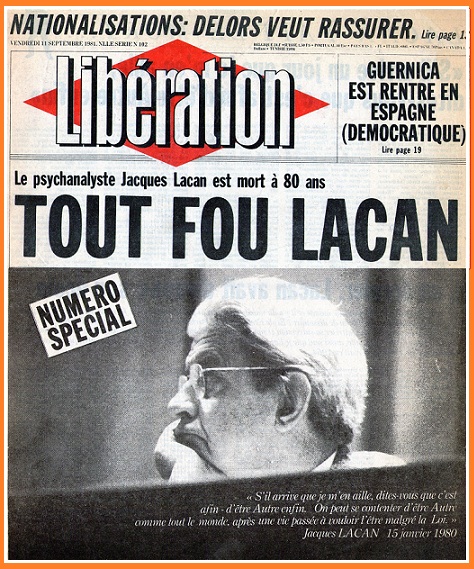An iconographic and text archive related to communication, technology and art.
☛ Libération: “Tout fou Lacan”, September 11, 1981. (Image source: La République des livres)
Famous French psychoanalyst Jacques Lacan died 30 years ago, on September 9, 1981. Above is the cover for the French newspaper Libération announcing Lacan’s death. It’s a pun, and a good one. Denis Hollier, in his A New history of French literature, explains the title and suggests a translation:
The most memorable example of this peculiar humor remains the first-page obituary of Jacques Lacan, the French psychoanalyst famous for having introduced outrageous puns into the most abstruse matters: “Tout fou Lacan,” a pun on tout fou (totally mad) and tout fou le camp (everything scrams). (Harvard University Press, 1994, p. 1043; Google books)
In her book Jacques Lacan & Co: a history of psychoanalysis in France, 1925-1985, Élisabeth Roudinesco offers further explanation about the historical and political context in which Lacan’s death was received in France:
While the newspaper of the PCF offered grandiose praise of this man who had never been favorable to their politics, Libération composed an explosive special issue. The headline was Lacanian to order, admirable in its humor and dash of journalistic genius: “Tout fou Lacan”. Beneath that slogan adapted to the 1980s, a photograph showed the master in profile, his chin encased in the palm of his hand. He seemed to be pondering with some curiosity the commotion of a major demonstration. On the inside, numerous chroniclers recalled the Surrealist adventure, the splits, Vincennes, and May1968. A series of puns punctuated the coverage: “Lacan nest plus, que Lacan même… Lacan nest plus, sue Lacan m’aime… Lacan nest plus, sue là quad même.” [Lacan is no longer, anything but himself… may he love me… anywhere but right here.] There was mention of Gloria Gonzales, psychoanalysis, and Pierre Goldmann. Libération was far and away the only newspaper to offer an account of the baroque character of the man, his doctrine and his unique school in French intellectual life. In 1981, the extreme Left emerging from the barricades was thus Lacanian: in its language, its style, its puns, and a certain uncontrolled way of seizing the signifiers of media-transmitted events. The children of Maoism recognized themselves in the figure of the master so intractable to the illusions of revolution. (tr. by Jeffrey Mehlman, University of Chicago Press, [1986]1990, p.680; Google books)
- By Philippe Theophanidis
- on
- ― Published in Communication
- Tagged: Lacan, obituary, philosophy, psychoanalysis, pun

